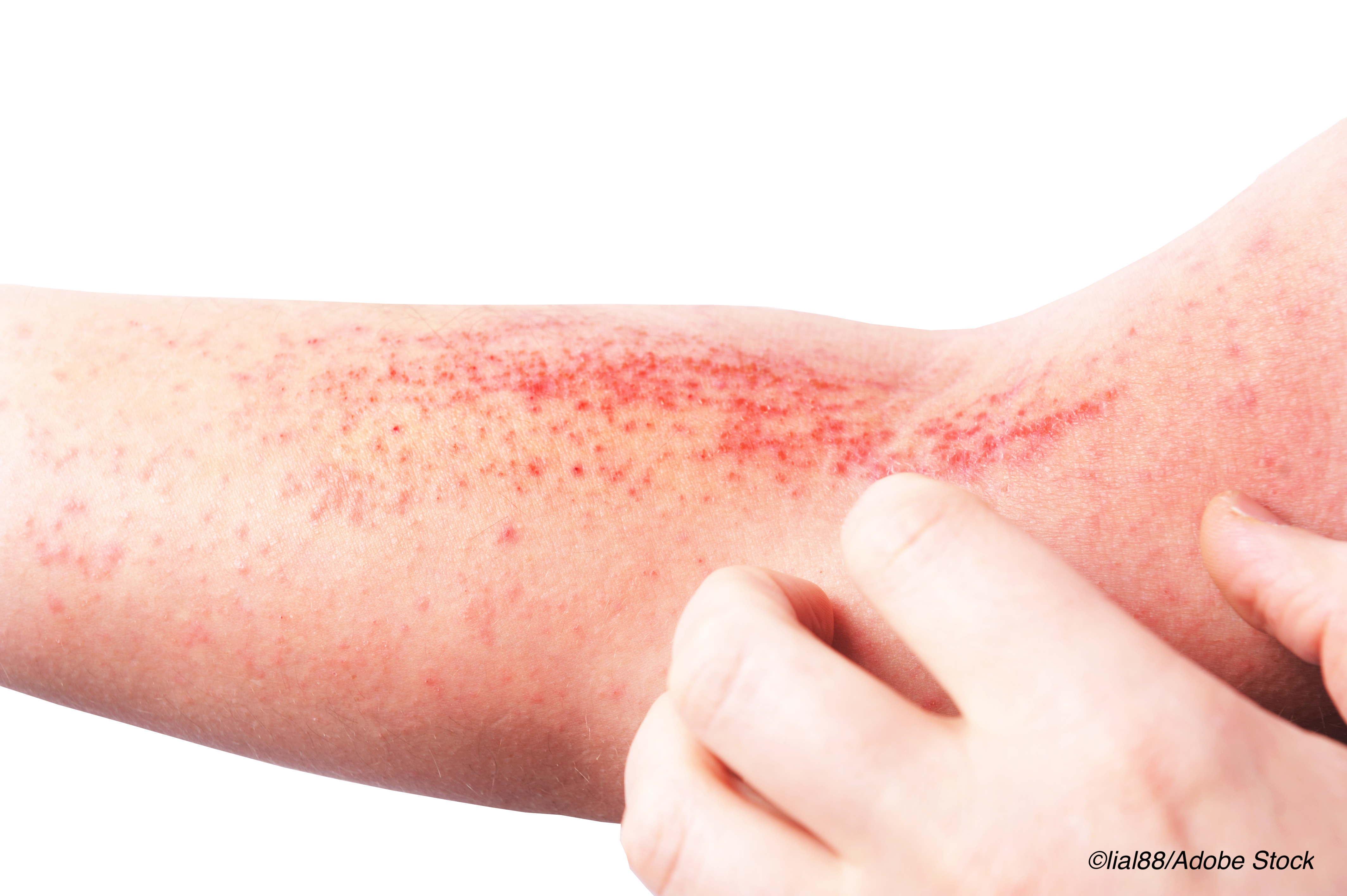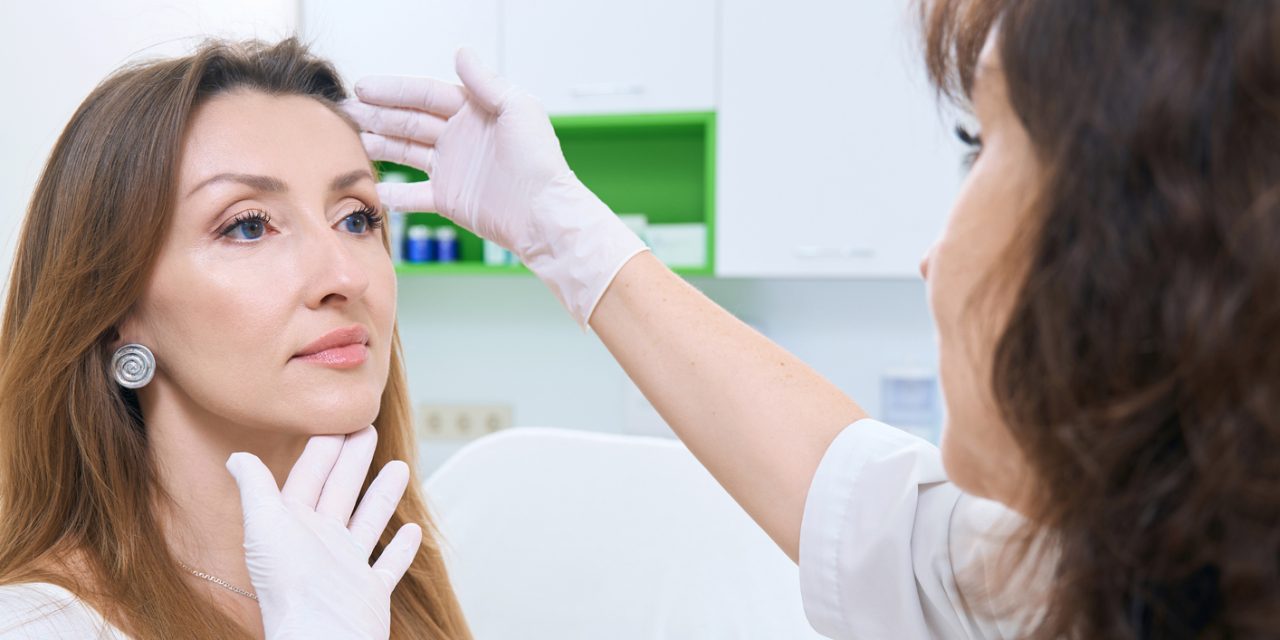
In patients with moderate-to-severe atopic dermatitis, treatment with abrocitinib — at doses of 100 and 200 mg — brought about significantly greater reductions in disease signs and symptoms at weeks 12 and 16 compared with placebo. Further, treatment with 200-mg abrocitinib, but not 100-mg abrocitinib, was superior to dupilumab in reducing itch response by week 2, according to study results published in The New England Journal of Medicine.
“The primary objective of the JAK1 Atopic Dermatitis Efficacy and Safety (JADE) COMPARE trial was to evaluate the efficacy of abrocitinib, as compared with placebo, at 12 weeks in patients with moderate-to-severe atopic dermatitis who were receiving background topical therapy. A key secondary objective was to evaluate the efficacy of abrocitinib, as compared with placebo and with dupilumab (an active comparator in another drug class), on the basis of a reduction in itch at 2 weeks,” wrote Thomas Bieber, MD, PhD, of the University Hospital of Bonn, Bonn, Germany, and fellow researchers.
Abrocitinib is an oral Janus kinase 1 (JAK1) inhibitor that acts to reduce interleukin-4 and interleukin-13 signaling. Dupilumab is an anti-interleukin-4-receptor alpha monoclonal antibody approved for the treatment of atopic dermatitis.
For this phase III, double-blind, randomized trial, 838 patients with atopic dermatitis were randomized to treatment with abrocitinib (100 or 200 mg once daily; n=238 and 226, respectively), subcutaneous dupilumab (300 mg every two weeks, after a loading dose of 600 mg; n=23), or placebo (n=131). All patients also received topical treatment.
By week 12, 48.4% of patients treated with 200-mg abrocitinib had met the primary endpoint of an Investigator’s Global Assessment (IGA) response—defined as a score of 0 (clear) or 1 (almost clear)—with an improvement of two or more points from baseline. This was compared to 36.6% of patients treated with 100 mg abrocitinib who achieved this level of improvement, 36.5% of those treated with dupilumab, and 14.0% of those in the placebo group (P<0.0010 for both doses of abrocitinib vs placebo).
Eczema Area and Severity Index-75 (EASI-75) response was also a primary endpoint, defined by researchers as a 75% or greater improvement from baseline score by week 12. This was met by 70.3% treated with 200-mg abrocitinib, 58.7% of those who received 100-mg abrocitinib, 58.1% of those treated with dupilumab, and 27.1% in the placebo group (P<0.001 for both abrocitinib doses vs placebo).
Superior itch response was seen at week two in patients treated with the higher abrocitinib dose, and not in those treated with the lower dose. Neither abrocitinib dose was significantly different than dupilumab in other key secondary end-point comparisons at week 16, including IGA and EASI-75 responses at week 16.
Nausea occurred more frequently with the 200-mg abrocitinib dose (11.1%), compared with 4.2% in those treated with the 100-mg dose, 2.9% of those treated with dupilumab, and 1.5% in the placebo group. Among patients treated with 200-mg abrocitinib, 6.6% had acne, compared with 2.9% of those treated with the 100-mg dose.
“Serious and opportunistic infections are considered to be a risk with JAK inhibitors in patients with rheumatoid arthritis. In the current trial, herpes zoster was reported more frequently with abrocitinib than with placebo or dupilumab, and serious infections occurred in two patients receiving abrocitinib,” wrote Bieber and colleagues.
Herpes zoster occurred in 1.8% of those in the 200-mg abrocitinib group, 0.8% in the 100-mg group, and none of the patients treated with dupilumab and placebo. Thrombocytopenia occurred in 0.9% of the 200 mg abrocitinib group and in no patients in the 100-mg abrocitinib, dupilumab, or placebo groups.
Conjunctivitis affected more patients in the dupilumab-treatment group (6.2%) compared with both the 200-mg (1.3%) and 100-mg (1.3%) abrocitinib groups. The incidence of other side effects such as nasopharyngitis, upper respiratory tract infection, and headache were similar in all the groups.
No major cardiovascular or thromboembolic adverse events occurred.
“The 200-mg dose, but not the 100-mg dose, of abrocitinib was superior to dupilumab with respect to itch response at week 2, but neither abrocitinib dose differed significantly from dupilumab with respect to most other key secondary end points at week 16. Longer and larger trials are necessary to determine the efficacy and safety of abrocitinib and to compare it with other JAK inhibitors and with biologic agents used for the treatment of atopic dermatitis,” Bieber et al concluded.
Limitations of the study are its inclusion of adults only, short duration, inability to assess superiority of abrocitinib over dupilumab in its two primary endpoints, lack of adjustment of confidence intervals for secondary endpoints, missing data for patients who withdrew, and insufficient data to assess the presence of comedonal acne.
-
Abrocitinib at a dose of either 200 mg or 100 mg once daily resulted in significantly greater reductions in signs and symptoms of moderate-to-severe atopic dermatitis than placebo at weeks 12 and 16.
-
Herpes zoster was reported more frequently with abrocitinib than with placebo or dupilumab, and serious infections occurred in two patients receiving abrocitinib.
Liz Meszaros, Deputy Managing Editor, BreakingMED™
This study was funded by Pfizer.
Bieber serves as a consultant in various capacities for Abbvie, Allmiral, AnaptysBio, Arena, Asana Biosciences, Bayer Healthcare, Boehringer Ingelheim, Dermavant, Eli Lilly and Company, Galapagos, Galderma International SAS, Glenmark, Kymab, LEO Pharma AS, Menlo, Novartis Pharma, Pfizer, Regeneron Pharmaceuticals Inc., Sanofi and Genzyme US Companies, and UCB.
Cat ID: 105
Topic ID: 75,105,730,105,449,192,923,925


